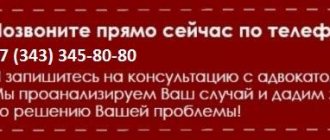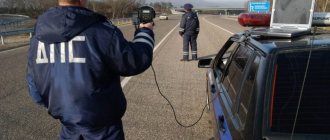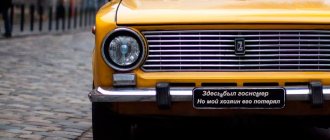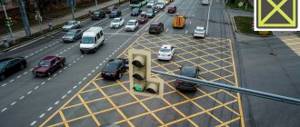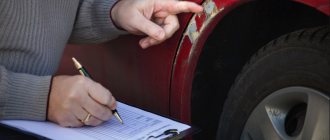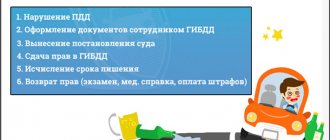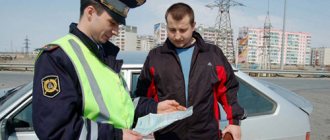What is the fine for a second violation under the Code of Administrative Offenses?
According to the provisions of the Code of Administrative Offences, it is considered that a citizen is in the status of having committed an administrative offense during the period of validity of the relevant resolution, as well as for another year after the end. Accordingly, if a person is caught for a similar act during this period, then this is considered a repeat violation . This is defined in Article 4.6 of the Code of Administrative Offenses of the Russian Federation.
If arrested, the person will be suspended from driving the car and given a fine. Further punishment is determined in accordance with the provisions of the Criminal Code of the Russian Federation.
Criminal liability for driving drunk twice
The measures provided for by the Criminal Code of the Russian Federation are applied to drivers who drove drunk twice in one year. This threatens him with the use of measures defined in Article 264.1 of the Criminal Code of the Russian Federation.
- Fine from 200 thousand to 300 thousand rubles. or equal to the salary received by a citizen for 1-2 years.
- Mandatory work lasting up to 480 hours.
- Forced work with a maximum period of 2 years.
- Serving a sentence of up to two years.
In addition, for up to 36 months , a citizen will be prohibited from working in certain positions or conducting certain activities.
The final penalty for repeat drunk driving may be limited to one or more penalties. Each case is individual and the court takes into account specific circumstances when considering the case.
More information about criminal penalties for drunk driving.
What is the penalty for repeat drunk driving?
If you have ever been disqualified for driving while intoxicated, but you are caught again, then two scenarios are possible.
You may become subject to both criminal and administrative liability. In many ways, it all depends on the time that has passed since the return of your rights to drive the vehicle.
Administrative responsibility
With the moment (date) of execution of the decision on punishment, the status of the offender does not change. Within a year after this, he is considered to be subject to administrative punishment. The fine was paid, the driver's license was returned, and the status of the offender was maintained. Only after a year will the negative status be lifted, and the citizen will not be recognized as subject to administrative punishment.
Driving a vehicle while the negative status is in effect will entail criminal liability. With the loss of status, administrative punishment will be applied for driving a vehicle while intoxicated, as if it was committed for the first time. It consists of imposing an administrative fine in the amount of 30 thousand rubles, as well as deprivation of the right to drive a vehicle for up to two years.
Also, if the driver was caught for drunk driving and it turned out during inspection that he does not have a license (for example, he was previously deprived of them ( not for alcohol )), if such actions do not contain a criminal offense, then according to Part 3 of Art. 12.8 of the Code of Administrative Offenses, an administrative arrest will be imposed for 10-15 days or a fine in the amount of thirty thousand rubles if the arrest is impossible.
Criminal - if caught for the second time in a year
For a motorist who is caught driving drunk twice in a year A violation is qualified as an action committed by a driver who has already been punished; in this case, Art. 264.1 of the Criminal Code.
In accordance with Article 264.1 of the Criminal Code, punishment:
When making a decision, the district court is guided by individual information and makes a decision based on certain circumstances of the case.
If there are casualties in an accident
Article 264 of the Criminal Code is devoted entirely to violation of traffic rules. Actions that entailed serious harm to health, as well as the death of a person, are considered in parts 2, 4, 6 of this norm.
In Article 264, the punishment for grievous bodily harm is considered in part 2, and part 4 of the same article of the Criminal Code stipulates that causing the death of a person while driving a vehicle while intoxicated or leaving the scene of an accident entails a penalty of imprisonment from 5 to 12 years, a ban on holding certain positions and carrying out specific activities.
If the consequence of a traffic accident is the death of two or more persons, then the term of criminal punishment increases to nine years, and the ban on holding a position lasts up to three years.
What happens if you are caught driving drunk a third time?
There is no separate article in the legislative acts that would indicate the measures applied to drivers for driving while drunk three times. Then you should use the norms of Article 32.7 of the Code of Administrative Offenses (clause 3), which states that in this case the period of withdrawal of rights is extended .
For example, when for the first time a license deprivation for alcohol was imposed for 2 years and at that time the driver was caught again for the same violation, then after 2 years and 1 day the second period of deprivation of the license will begin. If everything is repeated a third time, then the countdown of the next period of deprivation begins. The result may be a lifelong ban on driving, although there is no such measure in the legislative acts of the Russian Federation.
In addition to the confiscation of rights, for a “triple” violator the court usually imposes all or most of the prescribed measures.
Is it possible to challenge the repeated deprivation of rights for drunkenness?
Such a court decision can be challenged. To do this, you must file a claim in court, attaching documentary evidence of your innocence. One of the papers that will be required for such a process is a character reference for the guilty citizen. It is possible that the initial decision will be revised and the court will issue a different verdict: mitigation of sanctions or complete acquittal.
You can count on a reduction in the penalty for driving a car a second time while intoxicated only in the absence of serious consequences of the violation or in case of compensation for material damage.
How are the terms of imprisonment calculated if you are caught driving drunk again?
The method of calculating the period of deprivation of rights depends on what kind of punishment was determined in relation to the culprit.
If this is an administrative measure, then the first day will be the date on which the decision came into force. The period of revocation of rights for a second violation begins after the end of the first period.
For example, the rights were taken away on April 5, 2021 for 2 years. Then the last day of this period is April 4, 2021. Consequently, the countdown of the next period begins from 04/05/2019. The period of the driving ban is determined in the same way when committing the following similar violations. In other words, the deadlines add up.
The period of withdrawal of rights is determined differently if the perpetrator is sentenced to imprisonment. Based on Article 36 of the Penal Code of the Russian Federation, if a person is deprived of the right to engage in certain types of activities (in our case, driving a car), then this will be an additional measure. Therefore, its term is determined from the moment the period of the main punishment ends, i.e. imprisonment. Consequently, after release, the countdown of the period of withdrawal of rights will begin. In part 1 of Art. 36 of the Penal Code states that the period of punishment does not include the time when the convicted person was prohibited from engaging in any activity.
For repeated cases of non-compliance with traffic rules, the deadlines are as stated above.
Exactly the same method of determining the first day of deprivation of rights is used in the case of assignment of forced or compulsory work.
Drunk driving again: imprisonment
For quite some time, deputies in the State Duma have been considering the question of how severe the punishment is in case of drunkenness while driving a vehicle. The result of the discussions was the adoption of the following decision: repeated deprivation of a driver’s license (DR) is an insufficient measure for such a serious offense. Now, for such a violation, the driver can face imprisonment (the innovation began to take effect in 2015).
The fundamental reason why deputies were inclined to adopt such a strict measure was the fact that the number of accidents involving drunk drivers on the roads is constantly increasing, and even huge amounts of fines do not become an obstacle for them to repeatedly violate the Law.
In the current conditions, repeated deprivation of a car license for drunkenness can no longer be considered a fair measure, which was the reason for toughening the punishment.
Now the Criminal Code of the Russian Federation provides for punishment for repeated driving while intoxicated in the following amount:
- Administrative fine (amount of 200-300 thousand rubles) or in the amount of the salary/other type of income of the offender for a period of 1-2 years;
- Work (mandatory - up to 480 hours);
- Work (forced, up to 2 years);
- Imprisonment (up to 2 years);
We draw the attention of motorists that each of the above types of punishment is applied in combination with the fact that the offender is deprived of the right to engage in certain types of activities or hold specific positions for a period of up to 3 years.
In addition, the important point is that, regardless of the type of punishment (the list is given above) that is chosen for the violator, he will be subject to repeated deprivation of the right to drive a vehicle (you can lose your license for drunkenness if you relapse for a period of up to 3 years) .
It is important to understand that it is not the driver who chooses the punishment, but the court who chooses this punishment for him, making a decision on an individual basis (taking into account specific facts and circumstances).
Drunk driving: how is it punished under the Criminal Code if there are victims in an accident?
The provisions of the Criminal Code of the Russian Federation apply not only to those who repeatedly decided to drive a car while drunk, but also to car drivers who, while driving a car in such a state, became the culprits of an accident where people died as a result of the accident.
In such situations, the punishment may be as follows:
- The result of the accident was death for 1 person. Here the driver faces criminal liability (imprisonment for a period of 2 to 7 years) and deprivation of the right to drive a vehicle (up to 3 years);
- The result of an accident is the death of 2 or more people. Here the driver faces criminal liability (imprisonment for up to 9 years). As an alternative, punishment may be applied - forced labor (for up to 5 years) and deprivation of the right to drive a vehicle (for up to 3 years).
Prosecution for repeated drunk driving
This process consists of several stages.
- It begins with the identification of a violation by a traffic police inspector. This fact is recorded in the documents. Based on these papers, the driver is suspended from driving and sent for a medical examination. If necessary, they may prescribe tests and check-ups at a medical facility.
- Then the materials are transferred to the traffic police. There they are checked for mistakes made by employees of this organization. When the documents contain gross violations, the proceedings are terminated.
- If the traffic police determines that a repeated violation has been committed, an employee of this organization draws up a report on the termination of administrative prosecution. This situation requires a criminal investigation.
- Within three days from the date of drawing up the report, a decision is made to initiate criminal proceedings against the perpetrator. The fact of a violation is recorded in a special accounting book.
- In controversial situations Art. 223.2 of the Code of Criminal Procedure of the Russian Federation allows for an inquiry. This stage usually lasts one month, but in particularly difficult situations it can be extended to two months.
- At the end of the above steps, the driver is informed of the suspicion. The features of his new status and his legal status are explained to him. At this stage, the offender can come clean.
- The next step is filing an indictment. It is necessary to familiarize the accused with this document. Then the act is sent to the prosecutor's office.
- The prosecutor approves the act. Two days are given for this, after which the case is sent to court.
As you can see, the procedure consists of a fairly large number of stages. But in practice, such cases pass quickly, since most drivers admit their violation. Then the inquiry is carried out in an abbreviated form.
If a driver is caught driving drunk not for the first time, then, just as during the first arrest, he will be deprived of his license. But then this will not be the main, but an additional measure. The punishment itself will be much more severe. A driver who continues to “take it on his chest” before getting behind the wheel is fined larger sums. The court can also deprive a citizen of his freedom or assign him work (of a forced or compulsory nature). Then the period of withdrawal of rights will begin only after release or completion of the period of work. And a “repeated” violator will be prohibited from conducting certain activities or holding certain positions.
Deprivation of rights for alcohol intoxication in 2021
Home \ Services \ Deprivation of a driver's license \ Deprivation of a license for alcohol intoxication \ Deprivation of a license for alcohol intoxication 2021
In this article we will look at deprivation of rights for alcohol intoxication in 2021. And also examples of situations in which you can evade responsibility.
So, if you are deprived of your license for alcohol intoxication, then this article is for you. Deprivation of license for alcohol intoxication in 2021 has become the most common problem for drivers, because... Every year the police system of law enforcement agencies increases the statistics on identifying and depriving drivers of their licenses for alcohol. Thus, if in the territory of Moscow and the Moscow region in 2021, about 50-80 drivers were deprived of their rights for drunk driving every day, then in 2021, about 80-120 people are already deprived of their rights for drunk driving every day.
Grounds for deprivation of rights for alcohol intoxication in 2021
Cases of driving while intoxicated, unlike other cases, are considered in court in a special manner. Those. In order for a judge to issue a deprivation of rights for driving while intoxicated, it is enough to provide the court with only the completed protocols and a paper medium (check) with the readings of the Breathalyzer device, which must exceed 0.16 milligrams of alcohol per liter of exhaled air. In terms of time, consideration of such cases in court takes no more than 10 minutes. In 2021, the first time driver will be deprived of his license for alcohol intoxication from 1.5 years with an administrative fine of 30,000 rubles. But if a person has ever been imprisoned for driving while intoxicated, then he will be imprisoned for up to 3 years.
However, there are a number of situations that lead to the dismissal of cases for driving while intoxicated. Here are some examples of them:
- Traffic police officers did not see the person driving the vehicle. Most often, this situation occurs in parking lots located inside residential buildings. The man drank alcohol while in his car. At the same time, his car was running. One resident found the car suspicious, so he called the police. The arriving traffic police inspectors draw up a protocol for the person sitting in the car. However, according to the practice of our traffic lawyers, when handling such cases, people avoid deprivation of their rights for alcohol. We provide the court with the necessary evidence that refutes the fact that the person was driving the vehicle.
- The witnesses were not present or were partially present. As a rule, traffic police inspectors, having stopped a vehicle and identified signs of intoxication, first carry out all procedural actions, and only then draw up all protocols and attract witnesses. It is also not uncommon for witnesses to be brought in one by one, i.e. The witnesses did not even see each other. Our company has an established practice of handling such cases. Our auto lawyers carry out the necessary work with witnesses both in court and at their place of residence, which allows us to provide evidence to the court that confirms the fact that the witnesses were formally involved. This requires the exclusion of protocols from the case materials in which witnesses signed, which allows one to avoid deprivation of rights for alcohol.
- Carrying out an examination using a Breathalyzer device that has not passed verification. Sometimes traffic police officers conduct an examination for alcohol intoxication with a device without presenting the driver with a certificate of the last verification of this device. As a rule, this happens due to the fact that the statute of limitations for the last verification of the Breathalyzer device has already expired, but traffic police officers do not have any other devices that are on the balance sheet of the traffic police and were verified on time. In this regard, they are forced to carry out an examination either with their “non-standard” device or with a device with an expired verification. When providing assistance to drivers, our auto lawyers check this fact by making the necessary requests to the traffic police departments, and if necessary, we order a forensic examination of the devices that were used when examining drivers for alcohol intoxication. If it is established that the device did not pass verification on time, then the person will be found not guilty of driving while intoxicated, as proven by judicial practice.
- The traffic police officers themselves signed the protocols. Our company is contacted by people who were stopped by traffic police inspectors and were tested for alcohol intoxication. However, for some reason they did not sign the protocols drawn up. After reviewing the case materials, our auto lawyers establish the fact that the protocols contain signatures that do not belong to the driver in respect of whom they were drawn up. Based on this, we order a forensic handwriting examination of signatures, which subsequently exempts a person from deprivation of rights for driving while intoxicated. This fact also makes it possible to hold traffic police inspectors accountable for falsifying documents.
- and etc.
If you are facing deprivation of your license for alcohol intoxication, then you should not waste time!
Call us by phone or request a call back and get a free consultation from a leading auto lawyer!
+7 (495) 204-15-82
Request a call
Other popular services:
- Refusal of medical examination
- Leaving the scene of an accident
- Drifting into oncoming traffic
